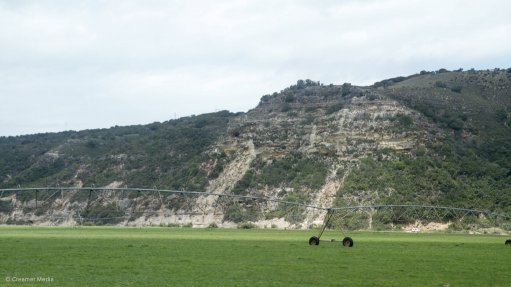
EMPLOYMENT RISK
The Gamtoos Irrigation Board warns that with reduction in the water quota, job opportunities could be lost
Photo by: Duane Daws
At the beginning of this month, the Nelson Mandela Bay metropolitan municipality, in the Eastern Cape, announced that it would be putting in place minimal water restrictions, with residents urged to reduce water use by at least 15%.
However, with the level of the Kouga dam, in the Eastern Cape, currently at less than 67% and declining, Eastern Cape water resources custodian the Gamtoos Irrigation Board (GIB) has for some time been raising concerns about the impact on GIB water consumers of the water restrictions that are to be implemented owing to a lack of good rains in the catchment area.
GIB CEO Pierre Joubert believes that such measures would probably not have been necessary, had the Nelson Mandela Bay metro, only recently having come under the leadership of a Democratic Alliance-led coalition, adhered to government-gazetted water restrictions of 15% implemented in July last year.
In a press statement last month, he said that these restrictions had not been adhered to.
Joubert added that the incomplete Nooitgedacht low-level water scheme, a project aimed at bolstering the metro’s water supply, was exacerbating water challenges and putting further pressure on the Kouga dam.
Media reports stated in 2015 that the project, valued at R450-million and initially touted for completion in 2013, was expected to be completed in 2017.
Joubert highlighted that reductions in the water quota would likely adversely affect employment, noting that a survey conducted by the GIB a few years ago had revealed that, when farmers, who rely on irrigation, receive their full allocated water quota, 10 000 employment opportunities are created in the Gamtoos Valley.
He warned: “With every 10% reduction in the water quota, 1 000 job opportunities are lost.”
Joubert suggested that the Nelson Mandela Bay metro had not been applying responsible water management.
“Their internal losses are unacceptably high. Apparently, they do not have enough money to maintain [infrastructure] or to give urgent attention to water leaks that are reported. It is time that the municipality get their priorities in order and deploy their resources more effectively, seeing that it has a direct impact on job creation and the economy in the Gamtoos Valley,” he said.
Joubert further warned that, if the level of the Kouga dam dropped to a level where water restrictions had to be implemented and it could be proved that irrigation farmers were suffering financial losses as a result, the GIB would not hesitate to institute claims against the metro.
The water system in the Gamtoos Valley is designed in such a way that the dam at Loerie serves as a balancing dam, which must always have water in it. It is from this dam that water is being rerouted to the metro.
“Although the metro already used up its full quota between last July and February this year, they have nevertheless continued to draw water from the [Loerie] dam,” said Joubert.
He said the possibility of a more manageable monthly, rather than a yearly, water quota for the metro was currently being investigated.
Joubert explained that, although the council did not have a say in the quotas for consumers, recommendations had been made to the Minister of Water Affairs, who would make the final decision. The responsibility for how the matter would be addressed with the metro, therefore, lay with the Department of Water Affairs, he concluded.